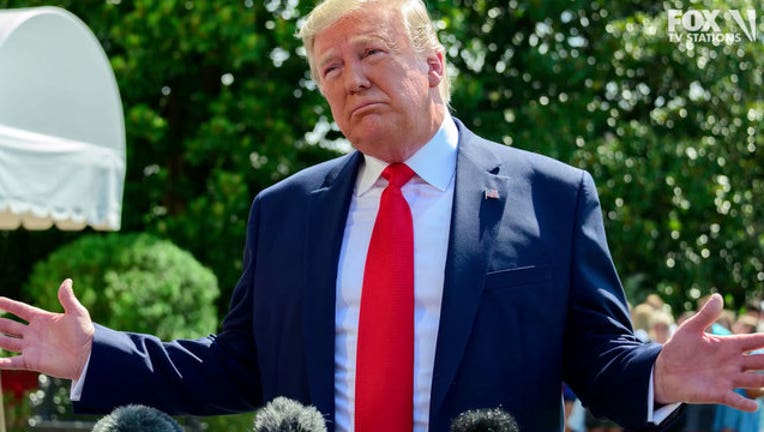At rally, Trump laces into his new Democratic foils

CINCINNATI (AP) - President Donald Trump opened a revved-up rally Thursday in Cincinnati by tearing into the Democrats he has been elevating as his new political foils, with attacks on four liberal congresswomen of color and their party's leadership of cities.
The president, who faced widespread criticism for not doing more to stop the chants of "Send her back" about Somali-born Rep. Ilhan Omar at a rally two weeks ago, did not mention Omar or her three colleagues by name in the opening moments of his Ohio gathering - but the target of his attacks was unmistakable.
"The Democrat party is now being led by four left-wing extremists who reject everything that we hold dear," Trump said of Omar and her fellow House Democrats Alexandria Ocasio-Cortez of New York, Rashida Tlaib of Michigan and Ayanna Pressley of Massachusetts.
But the fleeting mention did not lead to further chants. Nor did an extended attack on Democratic leaders of urban areas, which Trump has laced into in recent days as part of his incendiary broadsides against Rep. Elijah Cummings and the majority-black city of Baltimore.
"No one has paid a higher price for the far-left destructive agenda than Americans living in our nation's inner cities," Trump said, drawing cheers from the mostly white crowd in the packed arena on the banks of the Ohio River. "We send billions and billions and billions for years and years and it's stolen money, and it's wasted money."
The rally was the first for Trump since the "Send her back" chant at a North Carolina rally was denounced by Democrats and unnerved Republicans fearful of a presidential campaign fought on racial lines.
At Thursday's rally, Trump declared, "I don't want to be controversial." He suggested to his supporters hours earlier that he did not want to hear the chant about Omar, an American citizen who moved to the United States as a child.
Speaking to reporters before leaving the White House for Cincinnati, Trump said he didn't know whether they would chant anyway or what his response would be if they did - adding that, regardless, he "loves" his political supporters.
"I don't know that you can stop people," Trump told reporters. "If they do the chant, we'll have to see what happens."
The chant followed racist tweets Trump sent against Omar and three other first-term lawmakers of color, instructing them to get out of the U.S. "right now" and saying if the lawmakers "hate our country," they can "go back" to their "broken and crime-infested" countries.
Two weeks ago, Trump wavered in his response to the divisive cries, letting the chant roll at the rally, expressing disapproval about it the next day and later retreating from those concerns.
Since then, Trump has pushed ahead with incendiary tweets and a series of attacks on a veteran African American congressman and his predominantly black district in Baltimore. Heightening the drama, Trump's Ohio rally will come on the heels of a pair of debates among the Democrats who want to replace him and will take place against a backdrop of simmering racial tension in the host city of Cincinnati.
A variety of opinions about the chant dotted the crowd before the rally.
Robyn McGrail, 64, and her husband were celebrating their 44th wedding anniversary by attending their third Trump rally. She said that if the crowd did begin the chant, "I'll probably be cheering. If they don't like America, they should leave. We love our country."
Cynthia Wells, 63, a Cincinnati nurse, said she would follow Trump's lead.
"We listen to him and we won't do it," Wells said. "I don't think it will happen. If it does, we won't participate because he's against that. That's not what his message is."
Republican Rep. Steve Chabot, who represents a Cincinnati-area district, said Wednesday he hoped the crowd will avoid such chants this time, and he thinks Trump will react more quickly if does happen.
"I would discourage the crowd from doing anything inappropriate, and I think saying something like that would be inappropriate," Chabot said. "I would hope that the president would silence the crowd, tell them: 'Hey, don't do that, there's no place for that. It's not helpful, it's not right.'"
Trump, long accused of weaponizing race for political gain, has escalated his harsh language in recent weeks, beginning with racist tweets about Omar, the Minnesota congresswoman who moved to the United States as a child, and her Democratic House colleagues.
Days later, the Greenville crowd's "Send her back!" shouts resounded for 13 seconds as Trump paused in his speech and took in the uproar.
Democrats condemned the scene, and GOP lawmakers scrambled to denounce it lest the moment come to define their party heading into the next election. Though not faulting Trump himself, House Minority Leader Kevin McCarthy of California said the chant had "no place in our party and no place in this country."
After first saying he wasn't happy about the chant, Trump in subsequent days praised the "patriots" in the North Carolina crowd.
Trump captured Ohio by nearly 9 percentage points in 2016, and he fared somewhat better among midterm voters in Ohio than among voters in Rust Belt neighbors Michigan and Wisconsin. About half of Ohio voters, 49%, expressed approval of Trump's job as president, according to AP VoteCast, a survey of the electorate in 2018. Forty-four percent of voters in Michigan, and 43% of voters in Wisconsin, approved of Trump.
Several protests were planned around the Trump rally, including one at the nearby National Underground Railroad Freedom Center. It focuses on the slavery era and current struggles against injustice around the world.
___
Associated Press writers Zeke Miller in Washington and Andrew Welsh-Huggins in Columbus, Ohio, contributed to this report.
___
Follow Lemire on Twitter at http://twitter.com/@JonLemire and Sewell at http://twitter.com/@dansewell

